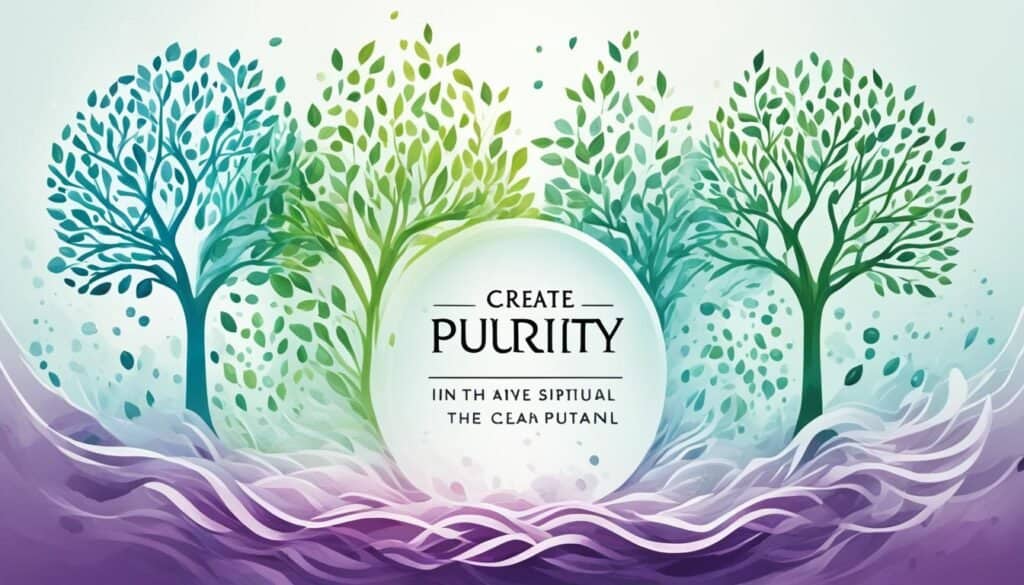Have we ever thought about what “unclean” means in the Bible? This term can be confusing and challenge how we see right and wrong. We’ll look into these old rules to see that being unclean doesn’t mean you’re sinful. These laws show us how the Israelites lived and help us understand what being holy means today.
We want to understand why these purity laws were important to the Israelites. We’ll use important Bible verses to show how purity was seen in those times. This will help us see the full picture of what living in holiness meant back then.
Key Takeaways
- The distinction between uncleanliness and sinfulness in Biblical teachings.
- The significance of community health and spiritual well-being in purity laws.
- Insights into historical religious practices of the Israelites.
- Understanding the deeper meanings behind Leviticus and its implications today.
- The ongoing relevance of purity concepts in modern faith communities.
The Purpose of Purity Laws
Purity laws were key to the Israelite community’s life. They kept the camp holy for God’s presence. By following these rules, people showed their devotion and respect for God.
These laws helped the community stay spiritually connected. For example, Deuteronomy 23:14 stressed the importance of being clean in body and spirit. This kept everyone united, sharing common values and practices.
Looking into purity laws helps us understand living by God’s standards. It makes us think about how our choices match our beliefs. In the end, these laws remind us to keep ourselves and our communities pure.
Distinguishing Between Clean and Unclean
In our study of biblical dietary laws, we focus on the key differences between clean and unclean animals as stated in Leviticus 11:3. This chapter gives clear rules for the Israelites on what animals they could and couldn’t eat. These rules were more than just food restrictions; they helped the people show respect for God’s commands.
Leviticus 11:3 sets out specific criteria, like whether an animal has hooves and chews its cud. These signs helped the community know what was clean or unclean. By sticking to these rules, the Israelites lived a life that matched their spiritual beliefs. These laws gave them a strong sense of who they were and helped build a community focused on mindful food choices.

Looking into Acts 10:15, we see a big change in how these dietary laws were seen. This moment shows a shift in how people viewed clean and unclean foods. The true meaning of these laws is still important today, showing us that it’s not just about what we eat but also our spiritual state. Thinking about clean and unclean foods makes us think about our own choices and values.
| Animal Type | Clean (Leviticus 11:3) | Unclean |
|---|---|---|
| Cow | ✓ | |
| Pig | ✓ | |
| Sheep | ✓ | |
| Rabbit | ✓ | |
| Deer | ✓ | |
| Shellfish | ✓ |
This table shows the differences between clean and unclean animals, based on Leviticus 11:3. As we look at these texts, we see the true value of these dietary laws. They helped people live a full life of faith and daily living.
Unclean but Not Sinful: A Deeper Look
In looking at purity laws, we focus on Leviticus 11:44. It says, “For I am the Lord your God. Consecrate yourselves therefore, and be holy, for I am holy.” This shows how important God’s holiness is. It tells us to reflect that holiness in our lives.
The purity laws help keep a sense of respect and reverence for God in the community. They are key to maintaining a connection with the divine.
Understanding Leviticus 11:44
Leviticus 11:44 reminds us that being unclean doesn’t mean we’re sinful. It’s a call for personal and community responsibility. The laws help the Israelites aim for holiness, showing the importance of purification in their relationship with God.
The focus is not just on the act of purification. It’s about living as God expects us to. This principle is crucial for our relationship with Him.
Holiness in the Camp of Israel
Purity laws were vital in the Israelite community. They created an environment where God could be present. These laws made the community accountable and spiritually healthy.
By focusing on God’s holiness, the Israelites had a special relationship with Him. This relationship was filled with guidance and protection. Following these laws made them feel like they belonged and had a purpose. Everyone worked together towards a common goal of holiness.
| Key Element | Purity Laws | Spiritual Implication |
|---|---|---|
| Purpose | Define clean and unclean | Encourage holiness and accountability |
| Practice | Ritual observance | Foster communal respect for God |
| Outcome | Enhanced spiritual unity | Deeper connection to God’s holiness |
Physical Health Benefits of Purity Laws
Purity laws have a big role in our health. By looking at Leviticus 11:32-34, we see how they might have kept the Israelites healthy. These laws could have helped avoid many health problems.
Practical Health Advantages in Leviticus 11:32-34
The rules in Leviticus helped protect against diseases. For example, not eating certain animals could have stopped parasitic infections. These laws might have made the community healthier.
In Deuteronomy 7:15, we learn that obeying God’s rules can lead to better health. This shows how our physical and spiritual health are linked.
| Aspect | Description |
|---|---|
| Disease Prevention | Avoiding unclean animals to reduce risk of parasites and infections |
| Community Health | Stronger public health through collective compliance with purity laws |
| Nutritional Value | Emphasis on clean, healthy foods contributes to better nutrition |
| Spiritual Wellness | Following laws fosters a sense of belonging and purpose |
Following Leviticus 11:32-34 and similar teachings helps us understand purity laws better. These rules guide us in living well and show how our health and spirituality are connected. We encourage readers to learn more about these ancient practices and their impact today by reading this article here.
Spiritual Symbolism in Purity Laws
In the Old Testament, the purity laws have deep spiritual symbolism beyond just physical cleanliness. They hint at the deeper purification found through Christ. This idea is clear in Hebrews 9:13-14, which talks about Christ’s sacrifice as a way to achieve spiritual redemption.
The rules in the Old Testament show the value of life and God’s desire for our holiness. They guide us to understand our spiritual state. Cleanliness symbolizes our effort to be holy, as 1 Peter 1:16 tells us to be holy in every part of our lives.
Looking into these laws helps us see our spiritual path. They teach us the importance of purification, helping us connect more with God. By understanding the spiritual symbolism in these laws, we improve our faith, making it more personal and communal. This aligns us with the hope given by Christ’s sacrifice.

Blessings of Obedience to God’s Commands
Understanding the blessings of obedience to God’s commands shows us big benefits for our spiritual and daily lives. By following His directions, we show respect and get many blessings. For example, Deuteronomy 28:1-14 talks about the rewards for staying true to God. It tells us about getting wealth, safety, and a strong community.
Malachi 3:10 also talks about the benefits of trusting God and following His commands. It tells us to give our tithes and offerings, promising us more blessings. This shows our loyalty and thanks to God, building a strong bond with Him.
By living by these teachings, we find the deep rewards of obeying God. This strengthens our bond with God and with others. Let’s remember the importance of these commands as they lead us to God’s favor and plenty.

Maintaining Community Holiness
In our journey to understand community holiness, we look at Numbers 5:3. This verse talks about ritual impurity and its rules. These ancient guidelines show us how important it is to keep our communities pure today. They teach us to remove anything that makes us impure.
This helps everyone in the community to grow spiritually and physically. It’s about creating a place where everyone can be their best.
The Importance of Ritual Purity in Numbers 5:3
Ritual impurity can harm the whole community’s spiritual health. Numbers 5:3 says if someone is impure, they must leave the camp. This keeps the community holy and reminds us all to look out for each other.
Let’s look at why these laws are important. Here’s a table that explains ritual purity in Numbers 5:3:
| Aspect | Description |
|---|---|
| Definition of Ritual Impurity | An individual’s state that makes them unsuitable for participation in communal worship or activities. |
| Consequences | Exclusion from the community to protect the spiritual integrity of the group. |
| Restoration Process | Specific rituals or sacrifices that individuals must undergo to regain purity. |
| Community Impact | Promotes a culture of accountability and spiritual vigilance among all members. |
These principles make us think about how our actions affect our communities. By keeping our communities holy, we help everyone grow spiritually.

Separation from Unclean Practices
Exploring 2 Corinthians 6:17 helps us understand spiritual purity better. It tells us to stay away from things that are not clean. This idea is crucial for our spiritual growth. The Old Testament teaches us to live a life that shows God’s holiness.
Scriptural Calls for Separation in 2 Corinthians 6:17
In 2 Corinthians 6:17, we get a clear message:
“Therefore, come out from among them and be separate, says the Lord.”
This call reminds us to choose differently. It shows how our choices affect our relationship with God and others.
The New Jerusalem in Revelation 21:27 takes this idea further. It shows a place where nothing unclean can go. This picture tells us about the future for those who follow God’s call for separation. By living a pure life, we get closer to God’s will and the beauty of the New Jerusalem.
Purity as a Reflection of God’s Character
Understanding purity as a reflection of God’s character changes our spiritual path. The Bible tells us to have clean hands and a pure heart when we seek God. Psalm 24:3-4 asks, “Who may ascend the Lord’s holy hill?” It shows us the need for integrity and following God’s holiness.
Who May Ascend the Lord’s Holy Hill? (Psalm 24:3-4)
Psalm 24:3-4 sets clear standards for those who want to be close to God: “He who has clean hands and a pure heart.” This scripture challenges us to examine our lives. It shows us the rewards of living a pure life. By focusing on purity, we can grow closer to God.
Our path to purity connects us with others in faith. As we work on our hearts, we become more like God. This journey helps us follow God’s teachings, making our spiritual life stronger. Living this way means we meet the standards of having clean hands and a pure heart.
Thinking about purity reminds us of our goal: to see God. Matthew 5:8 says the pure in heart will see God. This gives us hope and motivates us to keep working on ourselves. Pursuing purity leads to divine blessings and rewards that deepen our faith.
| Criteria | Biblical Reference | Connection to Purity |
|---|---|---|
| Clean Hands | Psalm 24:3 | Signifies actions and behaviors aligned with God’s will. |
| Pure Heart | Psalm 24:4 | Emphasizes the importance of inner motivations and thoughts. |
| Seeing God | Matthew 5:8 | Affirms the promise of divine connection for the pure in heart. |
Personal and Communal Cleansing
The idea of personal and communal cleansing is key to our spiritual path. In Ezekiel 36:25-27, God promises to clean His people, giving them new hearts. This change helps us connect more deeply with the Divine. James 4:8 also tells us to get closer to God by making our hearts pure. It shows how important it is to look inside ourselves and be honest in our faith.
Thinking about these verses shows us how we’re all connected in our spiritual growth. Our path to personal and communal cleansing includes:
- Regular self-reflection to see where we can do better.
- Being sorry for our mistakes and wanting to follow God’s plan.
- Getting our community to join us in prayer and thinking deeply.
- Building a place where everyone feels okay to talk about their problems.
By doing these things, we help create a holy space together. We start a path that brings us closer to God and to each other. It helps us grow in faith and build stronger bonds in our communities. The call for personal and communal cleansing motivates us to make a place where God’s love and purity shine every day.
How Does the Concept of Cleanliness in the Bible Relate to Being “Unclean but Not Sinful”?
The Bible emphasizes purity, both spiritually and physically, through cleanliness themes in the bible. Being “unclean but not sinful” refers to ritual impurity rather than moral wrongdoing, such as after childbirth or touching certain animals. While these states required purification, they did not necessarily equate to sin in the biblical context.
A Symbol of Spiritual Renewal
In our journey through Biblical purity laws, we see they’re more than old rules. They symbolize spiritual renewal. Titus 2:14 tells us that Christ’s sacrifice redeems and purifies us for a divine purpose. This change encourages us to seek holiness deeply.
1 John 1:7 also reminds us that Jesus’ blood cleanses us from all sin. This truth encourages us to live more intentionally. It shows how these scriptures inspire us to show grace in our actions and with others.
Seeing purity laws as symbols of spiritual renewal helps us understand and follow God’s commands better. It pushes us to show His love and forgiveness in our lives. We become empowered to live our purpose with spiritual integrity. Let’s dive deeper into this journey through the robes of righteousness and their role in our lives.
Affiliate Disclosure: "As an Amazon Associate I earn from qualifying purchases made from links in this post. We are a participant in the Amazon Services LLC Associates Program, an affiliate advertising program designed to provide a means for us to earn fees by linking to Amazon.com."

